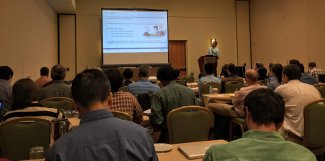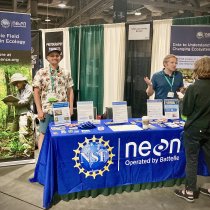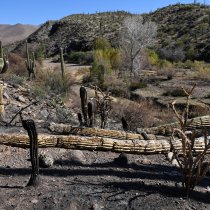Ameriflux PI meeting: an opportunity for collaboration and engagement
October 11, 2016
Five Battelle scientists, Stefan Metzger, Cove Sturtevant, Hongyan Luo, Natchaya Pingintha-Durden and David Durden along with software engineering manager Greg Holling recently attended the annual Ameriflux PI meeting to present on NEON project progress and talk shop.
Surface-atmosphere exchange lead Stefan Metzger gave a presentation (see bottom of story for download of presentation) on NEON's first release of eddy-covariance data products and software tools (scheduled for early 2017), as well as data formats, metadata, R-packages and more.
Several NEON posters (which may also be downloaded at the end of this story) provided additional information as well as starting points for lively discussions:
- From field notes to data portal – An operational QA/QC framework for tower networks, Cove Sturtevant
- Hierarchical data format for eddy-covariance data, David Durden
- QA/QC and uncertainty budget of NEON's eddy-covariance flux data product, Natchaya Pingintha-Durden
- NEON’s streaming processing pipeline for eddy-covariance raw data, Greg Holling
- NEON’s storage flux measurements of CO2 and H2O, processing and data products, Hongyan Luo

Stefan Metzger gives presentation on on NEON's first release of eddy-covariance data products and software tools at Ameriflux PI meeting. Associated article "Ameriflux PI meeting: an opportunity for collaboration and engagement"
The meeting also provided an opportunity to talk to participants about the full suite of NEON data that is collected at each site, and how the data products support interpretation of flux measurements. Participants were enthusiastic that many of these data are already available on the NEON Data Portal and eager for the upcoming release of eddy-covariance data and resources.
Together with their counterparts from AmeriFlux, Stefan Metzger, Cove Sturtevant and David Durden organized the breakout session “Processing best practices and methods including tools and workflows”. This session brought together about 30 scientists and engineers to discuss best practices and innovations in the flux community, including collaborative solutions envisioned and developed by the station networks. In particular, a lot of ideas and tools surrounding efficient data provenance “from field to final dataset” were discussed, along with the shareability of corresponding tools and data. Gaining feedback and ideas from this community will be very useful for the NEON project team as they continue to develop a science operations management system for the project to meet scientists’ needs.
Collaboration, interoperability and standardization across networks were common themes throughout the meeting and led to invaluable conversations about how to collaborate on developing file structures that are interoperable and implement standardized metadata conventions between networks. Participants were also eager to think about ways to make NEON data more accessible to the community. One scientist even came up with the idea of co-hosting a workshop on the benefits and simplicity of using newer data formats such as HDF5 (which NEON will use) on large-scale climate models.
The meeting ended with some lively discussions on potential future collaborations between NEON, AmeriFlux, ICOS and FLUXNET, including cross-network value-added data products.


